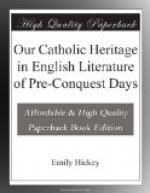A thousand years go on, and the burden of years is upon him, and he flies to a spacious lonely realm and there abides alone. He is lord over all the birds, and dwells with them in the wilderness. He flies westward, attended by a great throng, till he gains the country of the Syrians. Then he sends away his retinue, and stays alone in a grove, hidden from human eyes. Here is a lofty tree, blossoming bright above all other trees, and on this tree the Phoenix builds his nest, on a windless day, when the holy jewel of heaven shines clear. For he is fain by the activity of his mind to convert old age into life, and thus renew his youth. He gathers from far and near the sweetest and most delightsome plants and leaves, and the sweetest perfumes that the Father of all beginnings has made. On the lofty top of the tree he builds his house fair and winsome, and sets round his body holy spices and noble boughs. Then, in the great sheen of mid-day, the Phoenix sits, looking out on the world and enduring his fate. Suddenly his house is set on fire by the radiant sun, and amid the glowing spices and sweet odours, bird and nest burn together in the fierce heat. The life of him, the soul, escapes when the flame of the funeral pile sears flesh and bone.
Then comes the resurrection of the Phoenix, who rises from the ashes of his old body, young and wondrously beautiful. Fed on the honey-dew that oft descends at midnight, he remains a while before his return to his own dwelling-place, his home of yore.
When he goes he is accompanied by a great retinue of the bird-folk, who proclaim him their leader. Ere he reaches his own country he outstrips them all, and comes home alone in his splendour and his might. And the next thousand years go on, and again comes the change to this creature who has no dread of death, since he is ever assured of new life after the fury of the flame.
And so it is that every blessed soul will choose for himself to enter into everlasting life through the dark portals of death. Much of a like kind does this bird’s nature shadow forth concerning the chosen followers of Christ, how they may possess pure happiness here, and secure exalted bliss hereafter.
The allegorical significance is explained by the old poet at considerable length. The main thought is, of course, the great Resurrection in which, day by day, we all profess our belief; the Resurrection through the fire that “shall be astir, and shall consume iniquities”; the Resurrection at the Day of Judgement, when the just shall be once more young and comely in the glory of joy and praise, singing in adoration of the peerless King: “Peace and wisdom and blessing for these Thy gifts, and for every good, be unto Thee, the true God, throned in majesty. Infinite, high, and holy is the power of Thy might. The heavens on high with the angels, are full of the glory, O Father Almighty, Lord of all gods, and the earth also. Defend us, Author of Creation. Thou art the Father Almighty in the highest, the Lord of Heaven.”




